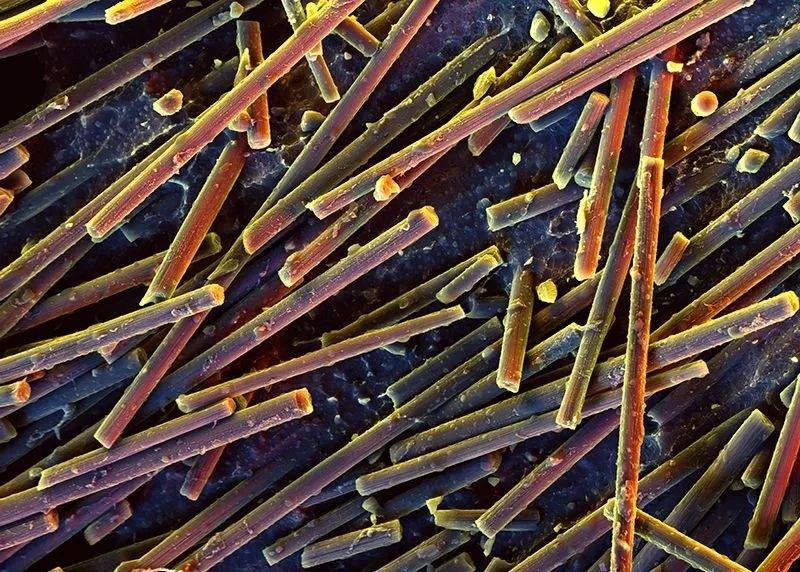科技工作者之家
科技工作者之家APP是专注科技人才,知识分享与人才交流的服务平台。
科技工作者之家 2019-09-02
来源:Nature自然科研

Hello Nature readers,
Today we discover the world’s biggest carbon-nanotube chip, ponder a US military request for an underground lair and hear a call to make PhDs more than just training for academia.

Carbon nanotubes are rolled up sheets of carbon atoms arranged in a hexagon pattern. Credit: Stefan Diller/ Science Photo Library
The world’s biggest carbon-nanotube chip
Scientists have created the biggest computer chip yet made from carbon nanotubes: rolled-up sheets of atom-thick graphene that conduct electricity at super-fast speeds. Some researchers hope these could replace silicon chips, which have been increasing in power as their transistor switches shrink in size, but are reaching a limit. The carbon nanotube device is far from a modern computer processing unit, but it churned out the message: “Hello, World! I am RV16XNano, made from CNTs.”
Nature | Read this article at nature.com/articles
Sharks and baby elephants get protections
Wild sharks and elephants will sleep easier in their beds after new protections were passed this week at the Convention on International Trade in Endangered Species (CITES). Eighteen threatened species of sharks and rays will now be under strict international trade regulations that aim to ensure any fishing will not threaten their long-term survival in the wild. And baby African elephants will no longer be allowed to be taken from their families in the wild and sent to zoos, except under exceptional circumstances.
BBC | Read this article at bbc.com/news
Mongobay | Read this article at news.mongabay.com
Wanted: Your huge underground warren
DARPA needs a “human-made underground environment spanning several city blocks with complex layout & multiple stories” — and it needs it by Friday. The US military’s research agency tweeted a call yesterday for “university-owned or commercially managed underground urban tunnels & facilities able to host research & experimentation”. Smart people here at Nature suggest that the request might be related to the agency’s subterranean challenge.
Vice | Read this article at vice.com/en_us/article
FEATURES & OPINION
Make PhDs more than just training for academia
Science PhD programmes cater almost exclusively to students bound for academia, but they don’t have to, says chemistry PhD candidate Sarah Anderson. She argues for academic requirements and extracurricular events to be expanded to reflect career paths that differ from those of the professors who administer them.
Nature | Read this article at nature.com/articles
The elements of business
“Mendeleev’s 150-year-old periodic table has become the menu for a world hungry for material benefits,” writes Economics editor Peter Coy in the introduction to this rather jazzy special issue from Bloomberg Businessweek. The magazine focuses on one compelling story for each of the elements up to and including uranium, tiptoes past the heavier elements and ends on a high note with a “superlegit, 100% scientific analysis of the most creative, not-at-all natural wonders.”
Bloomberg Businessweek | Read this article at bloomberg.com/features
Read more: Nature also did a special on the 150th anniversary of the periodic table and it was pretty great (from January)
A new ethics of quantification
The crisis in statistics — including calls for scientists to abandon statistical significance — should inspire a similar rethink of mathematical modelling, argues sensitivity analyst Andrea Saltelli. He calls for “a movement of resistance” to bring the assumptions, inadequacies and limitations of models out of the shadows.
Nature Communications | Read this article at nature.com/articles
QUOTE OF THE DAY
“My message to him is just to listen to the science.”
Arriving in New York after a 15-day sea journey from the United Kingdom, young climate activist Greta Thunberg shares her message to US president Donald Trump. (The New York Times)
Physicist Michael Betancourt asked Twitter for “your most treasured reviewer insult”. The responses include such gems as “This manuscript is to science as astrology is to astronomy.” Ouch! Happily, many are followed with stories of the author’s ultimate triumph, so it’s all very heartening. I promise to reply only in the most cordial terms if you email me with your feedback on this newsletter at briefing@nature.com.
Flora Graham, senior editor, Nature Briefing
Go to go.nature.com/wechat to get Nature Briefing in your inbox free every weekday or click Read More to read more about these stories.

来源:Nature-Research Nature自然科研
原文链接:http://mp.weixin.qq.com/s?__biz=MzAwNTAyMDY0MQ==&mid=2652563178&idx=3&sn=4f162a937133d98e7961ee06f1cbb7c1&chksm=80cd4864b7bac1727af53e2acf84bfb81153eedb151f515f26f149c647dc16d5bcdcda68b0fd&scene=27#wechat_redirect
版权声明:除非特别注明,本站所载内容来源于互联网、微信公众号等公开渠道,不代表本站观点,仅供参考、交流、公益传播之目的。转载的稿件版权归原作者或机构所有,如有侵权,请联系删除。
电话:(010)86409582
邮箱:kejie@scimall.org.cn